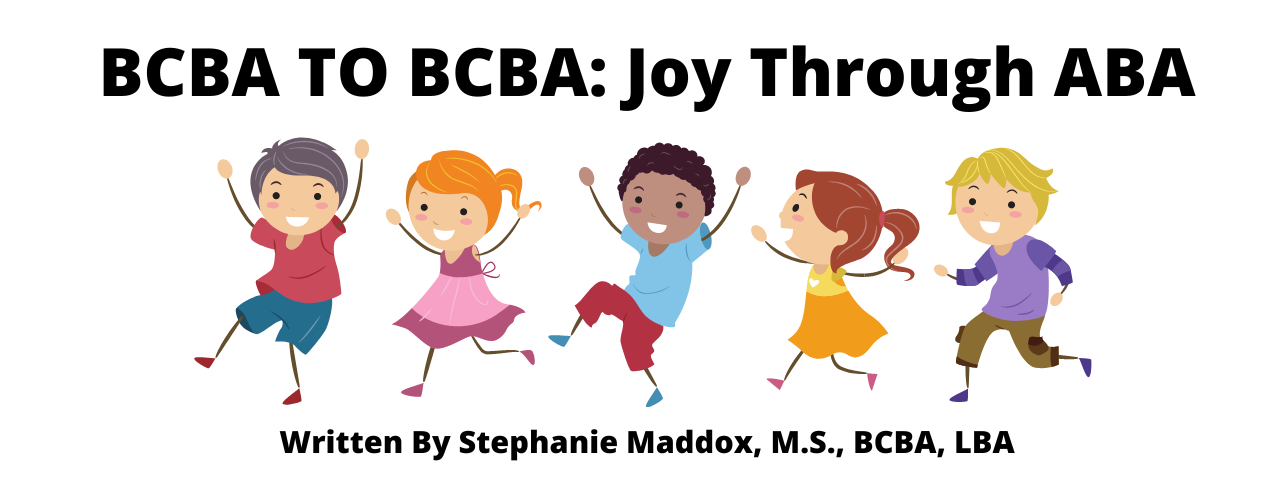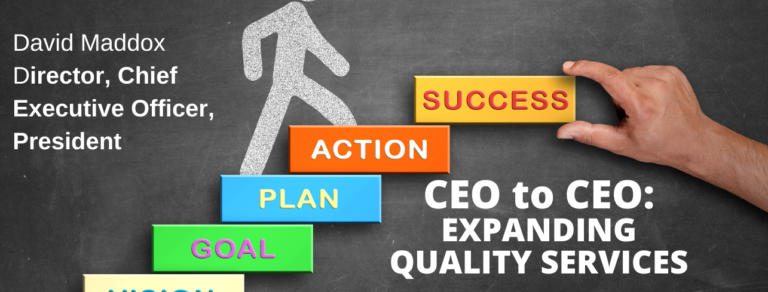As a non-BCBA franchisee, you can successfully establish a vibrant, effective ABA practice, but only through one or more BCBAs who are sufficiently competent to execute the many clinical duties involved. The Non-BCBA Franchisee/Lead-BCBA Relationship
While BCBA franchise owners may find this piece helpful, I am writing expressly this time to the non-BCBA franchisee.
As a non-BCBA franchisee, you can successfully establish a vibrant, effective ABA practice, but only through one or more BCBAs who are sufficiently competent to execute the many clinical duties involved—from credentialing to hiring techs, to taking on clients, to writing treatment plans, to obtaining authorizations, to training and supervision of techs, to making tech/client assignments, to managing/training parents, to collecting/interpreting data, to audit preparation, and much more. All of these duties are clinical in nature and require a BCBA (or equivalent) to perform.
Fortunately, there are far more BCBAs out there than there were when Stephanie and I started ABC Behavior in 2014–up from about 10,000 then to more than 50,000 worldwide today—the vast majority of whom are living in the U.S. And they generally have significant practical experience attending their valuable credentials. After all, even the freshly-minted have each completed at least 2,000 hours of supervised fieldwork along with their master’s program before passing a tough national exam.
But understand that few BCBAs are likely to have strong competencies in every area necessary to launch a serious practice. Hiring someone is only a starting point.
BCBA VS Clinical Practice Manager
A BCBA with three to five years’ full-time experience may have mastered one or two key areas of BCBA work. She may be particularly experienced and capable in parent-training, providing direct services, hiring techs, training techs, managing a team, growing a team, writing and executing treatment plans, knowing insurance rules/guidelines, maintaining paperwork, staying audit-ready, and/or have deeper specialties such as high-risk cases or children with various multiple diagnoses.
She may even have some associated administrative abilities to supplement her clinical skills, but she may not have sufficient perspective or insight to know what she doesn’t know (related to either admin or clinical tasks). Few know what they don’t know—especially regarding areas of work to which they have not yet been exposed.
A BCBA with 20 years’ experience should have deeper abilities, but might not have much broader competencies than the BCBA with three-five years—unless she’s maintained strong levels of personal initiative, obtained excellent training from an array of other expert clinicians, and exercised intensive professional development in multiple roles.
In our experience, we find that BCBAs are typically employed in a specialty role of some sort and allowed to develop expertise within that realm. Unless a BCBA has opened offices from scratch and supervised multiple other BCBAs, she likely does not have a full grasp of everything clinically involved in starting a practice, never mind the administrative aspects.
That said, a solid BCBA with several years’ experience in clinic-based or in-home services toward children with autism is a good starting-point candidate for a new practice if you have good chemistry and she is committed to the undertaking. Our Clinical Consulting team can help her develop her weak spots and the admin team can provide most of what you need with respect to credentialing, billing, payroll, business planning, P/R, etc.
The Right BCBA
Hiring a meaningfully competent BCBA is generally not overly formidable for someone with some capital and sufficient business acumen to inspire confidence in the BCBA that the business relationship will satisfy her personal and professional goals.
The search may take a few weeks and might require a couple of 30-60-day trial periods before finding a BCBA who fits with your own personality and skill set. Given the fact that credentialing can take longer than that, however, managing expectations is important.
When hiring, there are serious considerations to discern, evaluate, and negotiate. Is she going to hang in there to complete credentialing if it takes longer than hoped? If you pay a finder’s fee with a 60-day out, are you going to know enough about her to pull the trigger within that timeframe to keep her/let her go? Is she going to get paid salary, based upon billable hours, or based upon practice revenues/profits? What sort of incentives are built into her comp package? Are you overpaying/underpaying? Will she work direct cases to get you started? Will she learn what she doesn’t yet know, or is she more stuck within a past-familiar mode of working? Is she confident, honest, and trustworthy enough to help you learn the ropes as you go, or is she aloof and distant?
The more challenging part of the process isn’t hiring, though if you hire well you are miles down the road. The substantive value gets added as you build your working relationship over the first 12-36 months. Yes, many employees don’t even last that long. It may take several attempts before you find your long-term winners.
Patience is a crucial ingredient to the success of any business, but particularly when marrying entrepreneurship (you), healthcare admin support (Hi-5 ABA), and clinical expertise (your BCBA(s)). The undertaking is dynamic and rewarding, but also complex and not without pain and sacrifice. Knowing upfront that it’s costly and difficult while determining that the risk and effort are worthwhile, makes the inevitable struggles much easier to endure.
So You’ve Hired a BCBA…Now What?

CEO to CEO: The Non-BCBA Franchisee/Lead-BCBA Relationship
Once you’ve selected a BCBA and successfully negotiated her hiring, you will engage the complex business of learning how to assess her competency and performance. That’s going to involve growing your practical knowledge of the ABA industry and your understanding of your BCBA’s particular strengths, weaknesses, and motivations.
Without knowing the levels of your existing knowledge of the science or practice of ABA, or your business training or H/R experience, I cannot immediately predict where you will need to concentrate in your own educational development. Our business development staff can help you build a plan in that regard. What I can do is provide a few broad strokes as to how Hi-5 ABA and affiliated personnel may assist—particularly here with respect to the special challenges facing the non-BCBA franchisee.
The Hi-5 ABA training process is designed to launch a practice led by one or more BCBAs. If you are depending upon a BCBA and you lack knowledge or experience in the field, then you face a gap between what you now know and what you will need to know in order to fully assess your clinical staff and obtain full command of your business.
Closing that gap may take a considerable amount of time. People spend years preparing to provide
ABA services. Running an ABA business as a non-BCBA involves both finding a BCBA with whom you can effectively partner; it also involves developing your own knowledge and expertise such that you can work alongside highly-trained professional clinicians while contributing to the practice’s success with similar weight and gravity.
What you may lack in the early days can be compensated for with consistent, motivated effort; but dedicating yourself to a comparable level of mastery related to the business generally will help your BCBA “partner” feel less alone in the effort. And allow for the idea that it will take several years of concentrated effort to achieve such a level of knowledge. Your BCBAs will see your commitment level and tend to gauge their own devotion accordingly.
If you
select a BCBA who is reasonably competent, trustworthy and committed, then you are off to a good start. She should participate in the weekly Clinical Consulting office hours meetings offered by ABC Behavior. Our Clinical Consultants will happily copy you on correspondence between them and your BCBAs. The CCs will also provide you with feedback from time-to-time—particularly if they recognize serious deficits or concerns. They will also provide critical resources and guidance to your BCBAs.
The support that our Clinical Consultants provide, however, is clinical support to trained clinicians. Our CC program is designed to engage competent BCBAs who already have the basic clinical training necessary to acquire their credentials. The CC staff are not in a position to train non-clinical personnel who lack the four-plus years necessary to meet the basic minimum knowledge and experience required to function as an analyst.
Your interest in learning answers to clinical questions is admirable and may in certain cases be crucial to the success of your practice, but your clinical education is beyond the function of the CCs. When non-clinical personnel want to draw on our CCs for clinical training, the burden becomes quickly overwhelming.
There are plenty of objective third-party resources available to you, however—from free 40-hour RBT courses, to ABA classroom texts, to thousands of other books, articles, documents, and videos, including many in our library of materials to which you have free access.
Your primary and most direct appropriate source of answers to clinical questions is likely going to be your own clinical staff. Discuss your personal educational needs and expectations with your lead BCBA from the beginning. She will likely have good ideas about how to guide you toward reasonable expectations for yourself.
Your abilities to evaluate her work will take more time and probably accrue more indirectly, as she may lack sufficient objectivity to evaluate herself for you. As you observe her work in light of what you learn about the industry and the feedback you receive from the CCs, you will probably develop a fairly good sense of her performance within a few weeks. As you hire and watch other BCBAs, your insights will grow.
The Hi-5 ABA Dynamic
You have chosen to start a business within a young and dynamic field. ABA occupies a financially attractive position within the healthcare sector of the U.S. economy. Demand for ABA services generally far outstrips supply throughout the country. ABA’s role in treating children with autism is profound and largely without any comparable alternative, leading insurance coverage access in all 50 states with increasing coverage by Medicaid.
But like building any business, starting an ABA practice is not simple. There are many moving parts. Building a successful practice isn’t like taking on a paper route to make some extra money. It’s a career choice for those willing to work alongside dedicated professionals who take on profound challenges and fundamentally change the lives of those with special needs and their families.
We are in it for the long haul.
Hi-5 ABA is here to help those serious about building great ABA practices. We’ve done it again and again, in multiple locations around very different BCBAs. We love what we do and our value proposition to our franchisees is strong.
We are good at what we do, while at the same time devoted to doing it better. Our programs are designed to get franchisees started as quickly as possible, for the least expense practicable; but every individual practice depends upon the owner’s decisions, commitment, team, and future intangibles beyond anyone’s ability to know or guarantee.
What we can promise is a support system and team with a breadth and depth of expertise like no one else in the industry…devoted to helping you succeed every way we can. We count it our genuine honor to work alongside those who share the same heart of care and compassion for the families which need ABA services, and believe that together we will make a difference and find good success.
CEO TO CEO: Private Agencies Providing Government-Funded Services
https://hi5aba.com/blog/2021/09/20/private-agencies-providing-government-funded-services/
CEO to CEO: Fundamentals
https://hi5aba.com/blog/2021/05/03/ceo-to-ceo-fundamentals/
CEO to CEO: Is a BCBA qualified to open an ABA Practice without assistance from specialists in other fields?
https://hi5aba.com/blog/2021/03/04/is-a-bcba-qualified-to-open-an-aba-practice/









